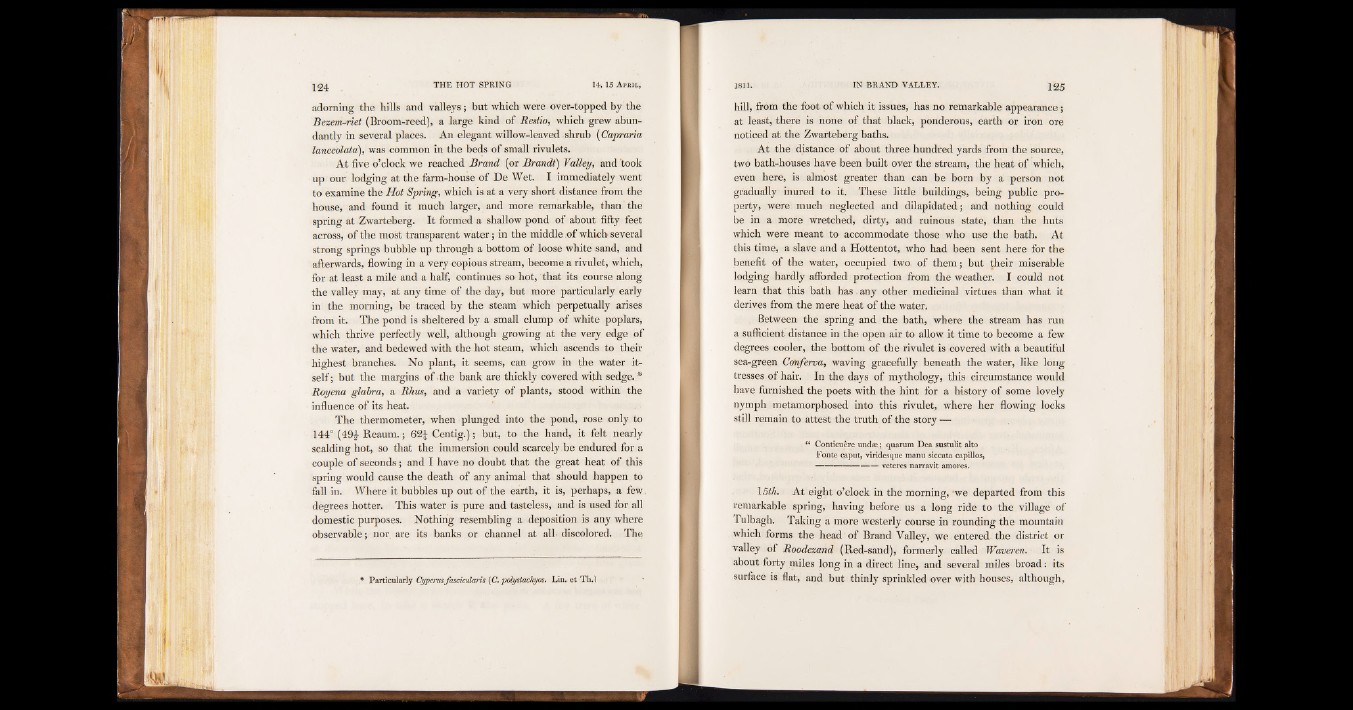
adorning the hills and valleys; but which were, over-topped by the
Bezem-riet (Broom-reed), a large kind of Restio, which grew abundantly
in several places* An elegant willow-leaved shrub (Capraria
lanceolate), was common in the beds of small rivulets.
At five o’clock we reached Brand (or Brandt) Valley, and took
up our lodging at the farm-house of De Wet. I immediately went
to examine the Hot Spring, which is at a very short distance from the
house, and found it much larger, and more remarkable, than the
spring at Zwarteberg. It formed a shallow pond of about fifty feet
across, of the most transparent water; in the middle of which several
strong springs bubble up through a bottom of loose white sand, and
afterwards, flowing in a very copious stream, become a rivulet; which,
for at least a mile and a half, continues so hot, that its course along
the valley may, at any time of the day, but more particularly early
in the morning, be traced by the steam which perpetually arises
from it. The pond is sheltered by a small clump of white poplars,
which thrive perfectly well, although growing at the very edge of
the water, and bedewed with the hot steam, which ascends to their
highest branches. No plant, it seems, can grow in the water itself
; but the margins of .the bank are thickly covered with sedge. *
Royena glabra, a Rhus, and a variety of plants, stood within the
influence of its heat.
The thermometer, when plunged into the pond, rose only to
144° (49J Reaum.; 62£ Centig.); but, to the hand, it felt nearly
scalding hot, so that the immersion could scarcely be endured for a
couple of seconds; and I have no doubt that the great heat of this
spring would cause the death of any animal that should happen to
fall in. Where it bubbles up out of the earth, it is, perhaps, a few.
degrees hotter. This water is pure and tasteless, and is used for all
domestic purposes. Nothing resembling a deposition is any where
observable; nor. are its banks or channel at all. discolored. The
* Particularly Cyperus fascicularis (C. polystachyos. Lin. et Th.l
hill, from the foot of which it issues, has no remarkable appearance;
at least, there is none of that black, ponderous, earth or iron ore
noticed at the Zwarteberg baths.
At the distance of about three hundred yards from the source,
two bath-houses have been built over the stream, the heat of which,
even here, is almost greater than can be born by a person not
gradually inured to it. These little buildings, being public property,
were much neglected and dilapidated; and nothing could
be in a more wretched, dirty, and ruinous state, than the huts
which were meant to accommodate those who use the bath. At
this time, a slave and a Hottentot, who had been sent here for the
benefit of the water, occupied two of them; but {heir miserable
lodging hardly afforded protection from the weather. I could not
learn that this bath has. any other medicinal virtues than what it
derives from the mere heat of the water.
Between the spring and the bath, where the stream has run
a sufficient distance in the open air to allow it time to become a few
degrees cooler, the bottom of the rivulet is covered with a beautiful
seiv-green Conferva, waving gracefully beneath the water, like long
tresses of hair. In the days of mythology, this circumstance would
have furnished the poets with the hint for a history of some lovely
nymph metamorphosed into this rivulet, where her flowing locks
still remain to attest the truth of the story —
“ Conticuere unda:; quarum Dea sustulit alto
Fonte caput, viridesque manu siccata capillos,
1 ------ veteres narravit amores.
15th. At eight o’clock in the morning, *we departed from this
remarkable spring, having before us a long ride to the village of
Iulbagh. Taking a more westerly course in rounding the mountain
which forms the head of Brand Valley, we entered the district or
valley of Roodezand (Red-sand), formerly called Waveren. It is
about forty miles long in a direct line, and several miles broad: its
surface is flat, and but thinly sprinkled over with houses, although,